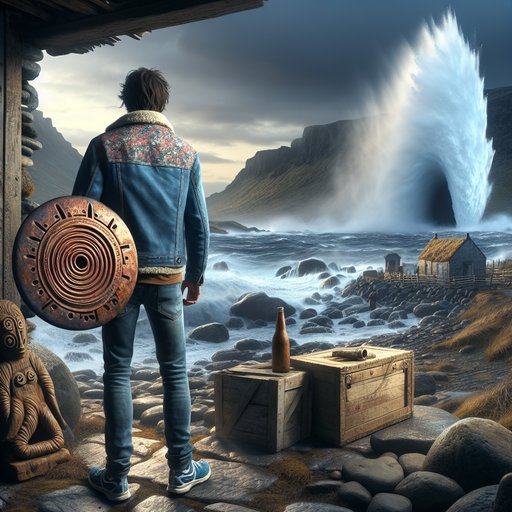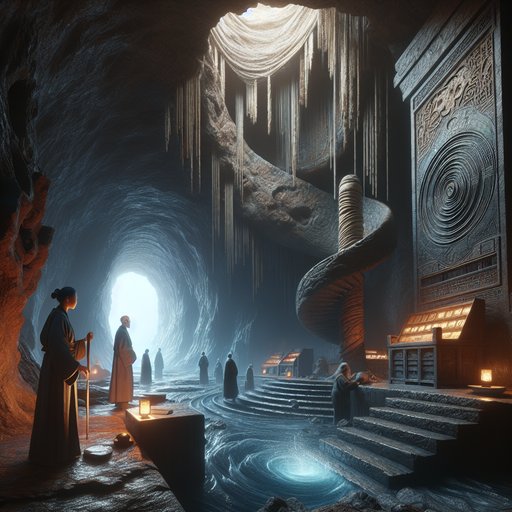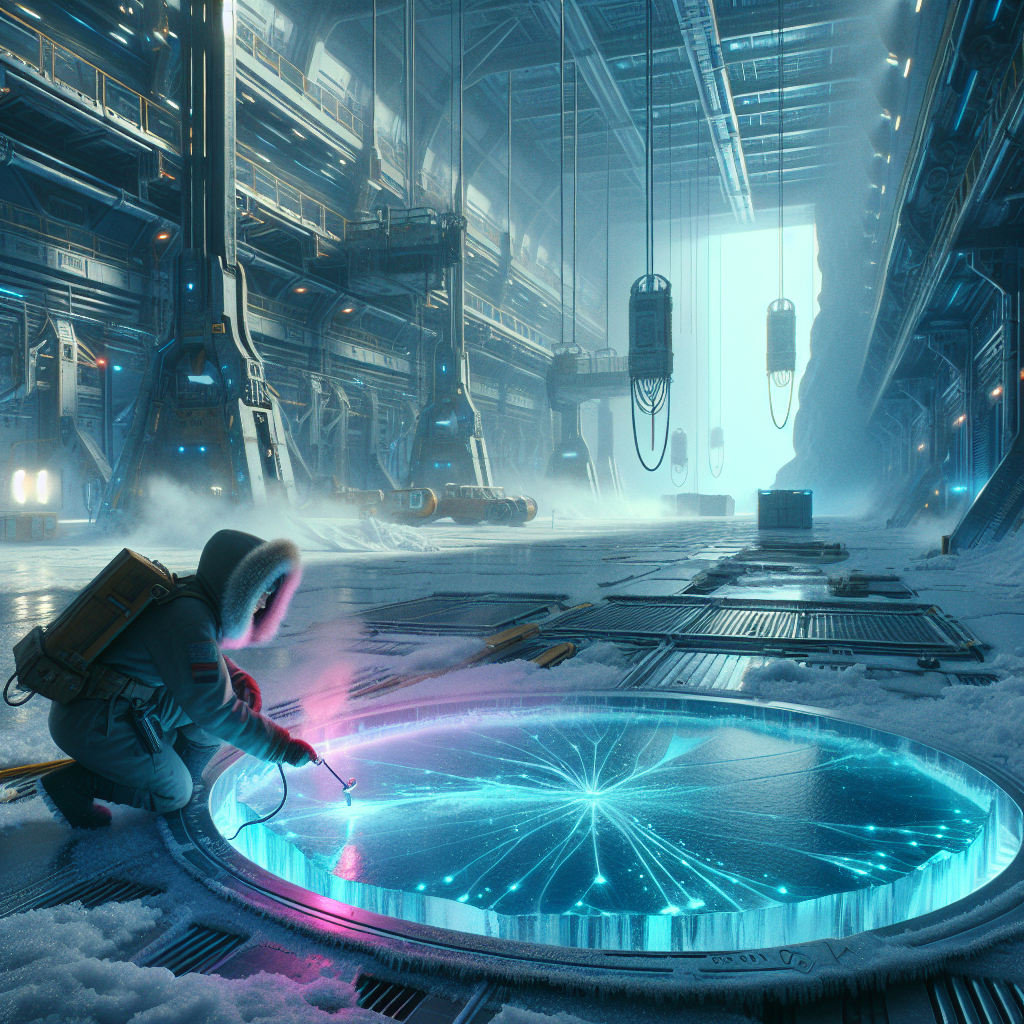CHAPTER 7 - The Breath Sealed and the Secret Kept

Barbra Dender, a red-haired, 31-year-old traveler raised by her grandparents after losing her parents at age four, comes to Socotra for the solitude, the untouristed corners, and the hum the islanders call Bab al-Riyah—the Door of Winds. In Hadibu she hears the cliffs breathe and notices spiral-with-three-notches symbols scratched into boats. An elderly market woman she helps gives her a palm-woven amulet sealed with red resin. Inside, Barbra finds a hidden goatskin strip: a map-poem pointing to a place where the sea breathes twice and repeating “Hoq.” When a copper disc engraved with the same spiral appears with the warning “Before the khareef,” she resolves to chase the clue with integrity, not force. With Salim, a taciturn driver, she tries a blowhole on the north coast, where aligning the disc does nothing. She meets a wary carver and a perceptive young woman who warns her away. At a courtyard gathering, a singer’s ditty hints that the island’s “second breath” exhales at Detwah Lagoon under a half-moon and ebbing tide. The recess gives up a new goatskin strip, but the resin smells wrong and the carvings are too sharp—Barbra realizes someone planted a false trail. A message arrives: “Not Hoq. The other breath.” She pivots inland toward Arher’s dune and limestone, where genuine dragon’s blood resin marks a spiral. The perceptive young woman—Samia—returns, revealing Keeper ties. Testing Barbra, she helps time the dual pulses of ocean and aquifer. Inside a breathing fissure, Keepers led by Samia’s uncle stop the shadows of suspicion. The copper disc is exposed as a decoy; the Monsoon Door is a door hidden within a door, a song hidden inside noise. Salim admits the elderly market woman—his grandmother—started Barbra’s test with the amulet. They need Barbra’s unfamiliar voice to close the aquifer gate before the khareef to keep salt from the inland water. Guided by a bone tuning fork and resin sockets, she opens a second panel with reversed notches and glimpses old records and a deeper passage that smells of incense. But an early storm surge throws the mechanism out of sync, and the lower gate threatens to fail. Barbra chooses integrity over discovery. She helps realign the breaths and seals the gate, preserving the Keepers’ archive and the island’s water. The mystery remains, its centuries-old secret kept, and the trust she earned and offered is honored. The Keepers gift her a fitting relic: a palm-sized copper wind-plate etched with the spiral and three notches, forged long ago from incense ship metal. Back home, Barbra sets it in her glass cabinet, remembering how some doors only open when they close, and how a song can guard a world.
The chamber shuddered as the first surge hit, a blunt shoulder of water battering the stone lip below us and sending a cold breath through the fissure. The newly revealed panel—the door within the door—groaned wider, and a draught smelling of old incense slid over my skin like a warning. Samia’s uncle lifted the bone tuning fork and struck it against the wall with the ceremonial care of a doctor tapping a knee. The tone it sang was thin but true, a thread of sound that braided with the cliff’s low hum until I could not tell where one ended and the other began.
“Choose,” the elder called above the rumble, his voice steady even as dust fell like pale rain. “Archive or water.”
I had wanted the archive with a hunger that embarrassed me, that spoiled-raspberry ache I got when I saw an unusual fringe of land on a map, the edge no one bothered to color. But the stench of salt pushing inland and the memory of my grandparents’ kitchen—tea steam and radio static—chose for me. They had taught me to hold what you could so the rest might remain: a garden through a drought, a roof against a storm, a story kept safe.
“The water,” I said, and surprised myself with how calm it sounded. My freckles prickled with sweat, and I felt the old flush I always resented creep across them, but there was nothing delicate about the work now. Samia’s uncle pressed the fork into my palm, his fingers warm, his eyes unreadable in the lamplight. “Your voice,” he said.
“Yours is not of our echo, so the door will hear it.” Around us, Keepers shifted and braced, resin-darkened hands finding purchase in sockets worn smooth by centuries of the same motions. Salim touched my shoulder and then stepped back, his mouth a thin line, the patched blue cap he always wore pulled low. “Count the breaths,” Samia said, her braid damp against her neck, the light cutting a slender bronze line along her cheek. The copper disc hung from my belt by its red cord, the decoy that had been more teacher than tool, its three notches glinting like cat’s eyes.
The first breath, ocean, arrived with a hiss across the lower stone; the second, the inland aquifer, rose like warm milk through a narrow throat. I raised the fork and hummed to catch it, adjusting as if I were tuning the old radio at my grandparents’ house: turn the knob past the static, retreat a hair, find the clear station hidden by noise. The fork’s tone lay under my voice like a white line on blue sea, and little by little the rock answered with a shiver that crawled under my soles. “Again,” the elder instructed, and I understood I had not yet struck the correct overtone.
Another surge shouldered the panel and made the notched lintel clack like teeth. I pulled breath and felt the cave draw with me, the way it had the first time I stood under Bab al-Riyah and thought the cliff itself had lungs. The reversed notch—Samia had shown me how the second door was opposite the first—caught a tacky smear of dragon’s blood resin and held, buying us a heartbeat. I heard Salim’s hurried whisper, a prayer I didn’t know, and over it the small sound of Samia’s aunt lighting another lamp.
The light showed the spiral carved along a pillar, weathered and true, not the crisp fakery of Detwah, and I reached for it in my mind. “Two…and now,” Samia counted, and I let the second breath lift the tone as if it were a kite catching a cleaner wind. The note split—my voice sliding into a harmonic I had not known I could make—and the narrow stair beneath our feet changed its song, the frequency’s teeth catching and holding. The panel that had been yawning closed its mouth like a patient yielding a jaw to a dentist, and the lower gate, the true aquifer door, began to move in the opposite direction.
Stone rubbed stone with a sound that was both scream and sigh, and warm air licked our faces in a steadying pulse. My lungs burned, but the fork rang as bright as a coin in sun, and I felt the cave’s breath settle into my bones. “Hold it,” the elder said gently, not as a command but as an invitation, and I held, and for a moment I was nothing but a tone among tones. The panel kissed its sill with a final soft thunk, and the aquifer gate slid home, capping the inland water with an oiled finality that felt older than my language.
The surge broke against a barrier we could not see, water splaying white and harmless in the lamplight, and ran away like a child who had changed its mind. When the hum fell into a lower register, the whole chamber seemed to exhale as one, an animal going from alert to rest. Samia’s palm brushed mine, a quick press that meant more than applause. Dust settled in lazy spirals, and the lamps steadied.
The elder bowed his head, then straightened, placing his palm over his heart in a gesture that echoed through the group. “The archive remains behind its breath,” he said, and the relief that warmed his careful face made him look suddenly younger. He took the copper disc from me and held it up to the lamplight, not accusing, but as if showing a child the first toy that had taught her balance. “A decoy, but a good teacher,” he said, and smiled in a way that loosened the knot between my ribs.
The grandmother stepped from the Keepers’ cluster as if she had been a shadow all along, her white scarf clean again despite a smear of resin lining her fingers. I recognized her by the wry angle of her mouth before she spoke. “Some doors open when closed,” she said, repeating herself with a glint in her eye, and despite myself I laughed. “You kept faith,” she said, and something unclenched inside me that had held since I was four and learned to do everything alone.
She nodded to Samia, who unwrapped a palm-sized bundle and placed it in my hands. The relic was a thin copper wind-plate, irregular and warm from the cloth, its surface hand-hammered to a sheen that caught even the dull cave light. The spiral-and-three-notches had been etched centuries ago with a burin that left tiny striations like a record’s groove, and when I tilted it, it sang under the breath moving through the fissure, a faint, intimate hum. “From a ship that carried incense when the world still smelled of frankincense and myrrh,” the elder said.
“Too small to betray us, strong enough to remember us.” The gift was not the archive’s heart, not a stolen page, not a pried gem, and for that it felt right. I cradled it as if it could bruise, the way I do with my favorite shoes when the night turns crowded. We climbed by lamplight, the fissure narrower going up, my blue-and-white Asics scuffed with limestone, my floral denim jacket dusted white like frost. Outside, the pre-khareef wind was a sag between gusts, a tired lung after a sprint, and clouds were marching on the horizon with more order than menace.
On the ridge, Samia paused beside me, her braid crusted with fine grit, eyes shining with the afterglow of work done well. “You will keep the story,” she said, not quite a question, and I nodded, thinking of my glass cabinet and the way I sometimes talk to it as if it were a friend. Below us, Hadibu’s whitewashed walls looked like shells turned in shallow water. “Forgive me,” Salim said as we descended, and the word came out so stiff I almost missed the tremor under it.
“For being part of their test.” He meant the amulet, the resin knot tucked in the limestone above town, the night his grandmother’s note had slid under my door like a thin fish. “You did not lead me wrong,” I said. “You led me to your trust.” He nodded, and we walked in companionable quiet the rest of the way down, our steps finding the same rhythm without effort. Back in my room, the whitewashed walls felt like a shell too, sound caught and shaped inside.
I washed dragon’s blood resin from my hands, the red sluicing into pink, then away, and caught my reflection: hair wild with cave air, freckles bold as always, shoulders square. I laid the day’s truths out on the bed: the palm-woven amulet, empty now but still smelling faintly of sun; the sea-glass shard with its three notches; the decoy copper disc on its red cord; and the wind-plate, humming faintly when I breathed on it. The plate felt solid compared to the others, less clue than conclusion, and yet it sang, a small private weather I could carry. At dawn I walked to the market, my tight jeans streaked with dust, tank top clean, the floral jacket over my arm.
I placed a packet of cardamom and a coil of honey-sweet bread on the grandmother’s stall and did not say a word. She weighed them, then slid a tiny lump of genuine dragon’s blood resin across to me as change, a wink tucked into the gesture like a second currency. “Before the khareef,” she said softly, and we both smiled because it was already done. The hum from the cliff was softer that morning, but I wondered if I was just hearing my own body finally steady.
On the ride to the airstrip, Salim kept the window cracked, and the wind braided itself into the truck’s cab in a calmer rhythm, as if the island had stopped holding its breath. We passed the fishing hamlet, and I saw Samia’s silhouette on the shore, one hand lifted in a precise wave. I lifted my hand from inside and let it hover, knowing this was enough. The sky had that divided look I love: half blue optimism, half the honest gray of weather to come.
I wrote the spiral symbol in my notebook one last time, then closed it gently. Home, my apartment’s light fell across the glass cabinet that takes up nearly a wall—silver river stone from Patagonia, a lacquered prayer plaque from a shrine the guidebooks forgot, a bronze weight from a dried river in Anatolia. I set the wind-plate on a narrow stand I once used for a shell and watched it catch the room’s shallow currents. It sang when the window was open and the street made its own small weather, and it sang when I leaned close and exhaled, a memory you could touch.
I found myself telling the cabinet the story, not the map of it but the feelings: the way the cave’s breath held mine, the tinny joy the tuning fork’s note put in my chest, the simple relief of a door closing the right way. When I finally slept, the surf I heard was not an ocean but the traffic turning a corner, the monsoon a rumor held in the copper on my shelf. The mystery remained—its archive sealed where it should be, the families’ trust intact, the song inside the noise still theirs—and that felt exactly right. I do not need every door to open; some journeys are complete when you leave them closed.
I slept easy, my freckles the last things to dim in the dark, and in the morning the wind-plate’s faint hum greeted me like a friend, proof that I had been in the breathing heart of a secret and left it whole.
















































































